外研版九上M7U1课件
合集下载
外研版九年级上册M7U1 ppt课件
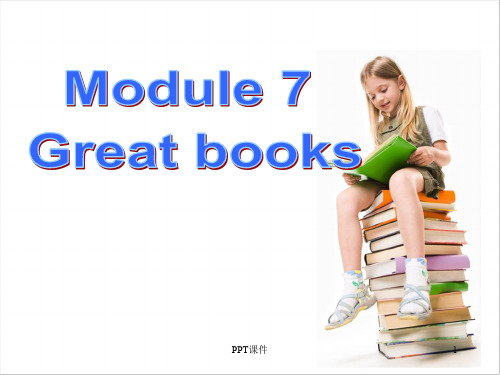
PPT课件
9
Read and match.
a) He was a very wise man.
1. Confucius
b) He is not as well-known as the other two people, but his works are still popular.
2. Shakespeare
c) His plays are read by millions of people.
3.Mark Twain
d) He was more a teacher and thinker than a writer.
e) People are still influenced
byPPhT课i件s ideas.
4.
William Shakespeare was English and wrote _p_la_y_s__a_n_d__p_o_e_m_s__.
5. He died __a_b_o_u_t_4_0_0__ years ago.
6.
His plays are still seen, and his poems _a_r_e_s_t_il_l _re_a_d_ by many people.
7. Mark Twain was _a_n_A__m_e_r_ic_a_n_ writer.
His stories are set _in__th__e_s_o_u_t_h_ of the US
8. over 100 years agoPPT课件
5
/ kən'fju:ʃjəs /
Confucius was a great
2.He died in Beijing on January 26, 2000. 3.He was a great Chinese thinker as well as a
九年级英语上册(外研版)教学课件-M7U
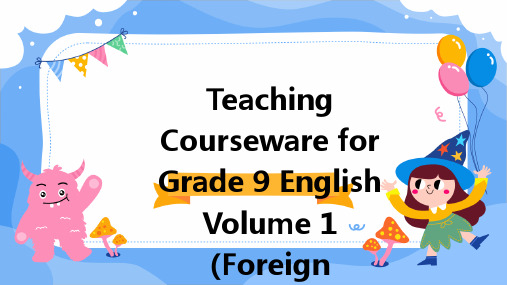
Teaching Courseware for Grade 9 English
Volume 1 (Foreign
目录
• Teaching objectives • Teaching content • teaching method • teaching process • Teaching evaluation
总结词
以完成具体任务为目标,让学生在完成任务的过程中学习语 言。
详细描述
教师根据课程内容,设计出具体的任务,如解决问题、分析 数据、撰写报告等,让学生在完成任务的过程中运用英语进 行交流和合作,从而提高学生的语言应用能力和问题解决能 力。
cooperative learning
总结词
通过小组合作的方式,让学生在互相帮助、互相学习的过程中学习语言。
Evaluate the quality of assessments and feedback
provided to students, ensuring it is timely and
constructive.
Growth
Monitor the growth and progress of students,
02
Text content understanding
Students are guided to comprehend the main idea, supporting
details, and the relationships between different parts of the text.
Review
Recap the key points and language learned in the lesson.
Volume 1 (Foreign
目录
• Teaching objectives • Teaching content • teaching method • teaching process • Teaching evaluation
总结词
以完成具体任务为目标,让学生在完成任务的过程中学习语 言。
详细描述
教师根据课程内容,设计出具体的任务,如解决问题、分析 数据、撰写报告等,让学生在完成任务的过程中运用英语进 行交流和合作,从而提高学生的语言应用能力和问题解决能 力。
cooperative learning
总结词
通过小组合作的方式,让学生在互相帮助、互相学习的过程中学习语言。
Evaluate the quality of assessments and feedback
provided to students, ensuring it is timely and
constructive.
Growth
Monitor the growth and progress of students,
02
Text content understanding
Students are guided to comprehend the main idea, supporting
details, and the relationships between different parts of the text.
Review
Recap the key points and language learned in the lesson.
外研版九年级英语上M7 U1课件

b) He is not as well known as the other two people, but his works are still popular.
c) His plays are read by millions of people.
d) He was more a teacher and thinker than a writer.
1 We're still influenced by Confucius's ideas. 2 Shakespeares plays also make a lot of sense to us today. 3 He was important, but I suppose he isn't as
e.g. I can’t find my watch. It may be in your pocket. 我找不到我的手表了,它可能在你的口袋里。
3. make a lot of sense to … 对……有重要意义 4. by the way 顺便说一下 5. I suppose that … 我认为 6. as … as 和……一样
Most of us think…We think we learn…
汉译英。
Practice
1.怎么啦?出什么事了? 1. What’s up?
2.列……的清单
2. make a list of
3.对……有重要意义 3. make a lot of sense to …
4.顺便说一下 5.为什么不……?
Key Points
1. What’s up? 怎么啦?出什么事了? 2. maybe 或许
副词,在句中作状语,相当于perhaps,常位于句首。 Maybe she’ll come this afternoon. 她可能今天下午来。
c) His plays are read by millions of people.
d) He was more a teacher and thinker than a writer.
1 We're still influenced by Confucius's ideas. 2 Shakespeares plays also make a lot of sense to us today. 3 He was important, but I suppose he isn't as
e.g. I can’t find my watch. It may be in your pocket. 我找不到我的手表了,它可能在你的口袋里。
3. make a lot of sense to … 对……有重要意义 4. by the way 顺便说一下 5. I suppose that … 我认为 6. as … as 和……一样
Most of us think…We think we learn…
汉译英。
Practice
1.怎么啦?出什么事了? 1. What’s up?
2.列……的清单
2. make a list of
3.对……有重要意义 3. make a lot of sense to …
4.顺便说一下 5.为什么不……?
Key Points
1. What’s up? 怎么啦?出什么事了? 2. maybe 或许
副词,在句中作状语,相当于perhaps,常位于句首。 Maybe she’ll come this afternoon. 她可能今天下午来。
外研版九年级英语上册M7U1课件ppt

埃里克森称他是“足球场上最好的球 员”。
在日常生活中,随处都可以看到浪费 粮食的 现象。 也许你 并未意 识到自 己在浪 费,也 许你认 为浪费 这一点 点算不 了什么
这句话里的more … than …表示 “与其说 是…不如说是…”,肯定more后面的,否定 than后面的。
1 He is more lucky than clever. 与其说他聪明,不如说他幸运。
2 He is more a scholar than a teacher. 与其说他是位教师,不如说是位学者。
3 Success is __m__o_r_e__ hard work _t_h_a__n___ good luck. 成功来自努力,而非运气。
在日常生活中,随处都可以看到浪费 粮食的 现象。 也许你 并未意 识到自 己在浪 费,也 许你认 为浪费 这一点 点算不 了什么
C. experience D. sense
在日常生活中,随处都可以看到浪费 粮食的 现象。 也许你 并未意 识到自 己在浪 费,也 许你认 为浪费 这一点 点算不 了什么
7. …, but I suppose he isn’t as well-known as Confucius or … suppose v. 猜想;猜测;相信;认为 1 As she's not here, I suppose she must have gone home. 因为她不在这儿, 所 以我猜想她一定已回家了。 2 What makes you suppose that I'm against it? 你根据什么推测我反对这事?
2. What’s up?
What’s up?这个句型是“怎么了?/出了 什么事”的意思。也可以是打招呼方式, 问对方近来如何。
在日常生活中,随处都可以看到浪费 粮食的 现象。 也许你 并未意 识到自 己在浪 费,也 许你认 为浪费 这一点 点算不 了什么
这句话里的more … than …表示 “与其说 是…不如说是…”,肯定more后面的,否定 than后面的。
1 He is more lucky than clever. 与其说他聪明,不如说他幸运。
2 He is more a scholar than a teacher. 与其说他是位教师,不如说是位学者。
3 Success is __m__o_r_e__ hard work _t_h_a__n___ good luck. 成功来自努力,而非运气。
在日常生活中,随处都可以看到浪费 粮食的 现象。 也许你 并未意 识到自 己在浪 费,也 许你认 为浪费 这一点 点算不 了什么
C. experience D. sense
在日常生活中,随处都可以看到浪费 粮食的 现象。 也许你 并未意 识到自 己在浪 费,也 许你认 为浪费 这一点 点算不 了什么
7. …, but I suppose he isn’t as well-known as Confucius or … suppose v. 猜想;猜测;相信;认为 1 As she's not here, I suppose she must have gone home. 因为她不在这儿, 所 以我猜想她一定已回家了。 2 What makes you suppose that I'm against it? 你根据什么推测我反对这事?
2. What’s up?
What’s up?这个句型是“怎么了?/出了 什么事”的意思。也可以是打招呼方式, 问对方近来如何。
外研九年级英语上册module 7 unit 1 课件(共16张PPT)
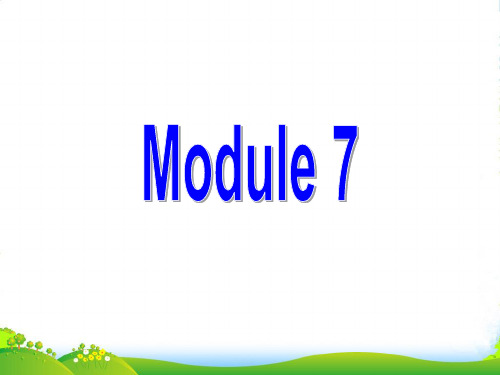
Listen again and complete the sentences.
1. Confucius is well-known in _m_a_n_y__c_o_u_n_t_ri_e_s___.
2. Shakespeare wrote __p_l_a_y_s_a_n__d_p_o_e_m__s. 3. Mark Twain’s stories are set
He says that Confucius was a very (5)_w__is_e___ man. Mr Jackson thinks that we are still (6)_in_f_lu_e_n_c_e_d__ by Confucius’s ideas and that Shakespeare’s plays still make (7)__se_n_s_e_ to people today.
b) He is not as well-known as the other two people, but his
works are still popular.
c) His plays are read by millions
2. Shakespeare of people.
d) He was more a teacher and
当堂检测
学考精炼 P69 词汇专练
P71 四五题
1、书籍是朋友,虽然没有热情,但是非常忠实。2022年4月21日星期四2022/4/212022/4/212022/4/21 2、科学的灵感,决不是坐等可以等来的。如果说,科学上的发现有什么偶然的机遇的话,那么这种‘偶然的机遇’只能给那些学有素养的人,给那些善于 独立思考的人,给那些具有锲而不舍的人。2022年4月2022/4/212022/4/212022/4/214/21/2022 3、书籍—通过心灵观察世界的窗口.住宅里没有书,犹如房间里没有窗户。2022/4/212022/4/21April 21, 2022
外研版九上M7U1课件
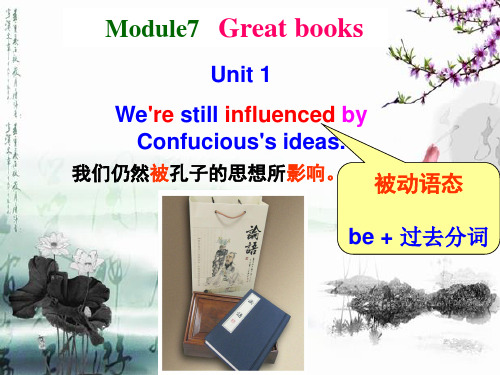
我们先看以下的句子:
1. We clean the classroom every day. The classroom is cleaned by us everyday. 2. We use computer every day. Computer is used by us everyday. 3. We brush our teeth every day. Our teeth are brushed by us everyday.
一般现在时被动语态的各类句式总结如 下:
肯定句 主语+am/is/are+过去分词+(by-)
主语 +am/is/are not+ 过去分词 +(by-) 一般疑问 Am/Is/Are+主语+过去分词+(by-)? 句 特殊疑问 特殊疑问词+am/is/are+主语+过 句 去分词+(by-)? 否定句
speak --- spoke --- spoken
discuss v. 讨论 --- discussion n.
thinker n. 思想家 think v.
wise adj. 有判断力的, 明智的
review n. 评论(文章)
influence v. 影响,作用于
sense n. 道理,意义,合理性 make sense 易理解,合情理,有 意义
首先要对粮食有明确的定位对其特点加以新的诠释当今国内外粮食安全形势发生了新变化必须重新认识粮食安全问题
Module7 Great books
Unit 1 We're still influenced by Confucious's ideas.
外研版九年级上册英语M7U1授课课件
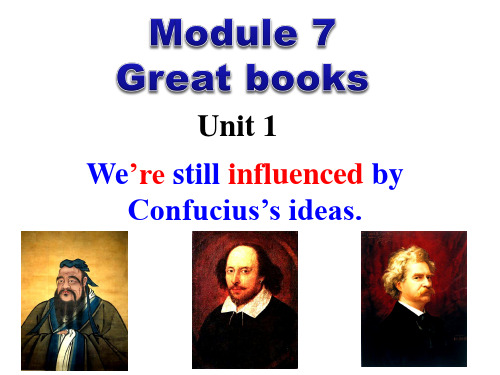
• There is a dialogue about them.
Listening (1)
4 启导精思
1 What does Mr. Jackson think of Confucius?
A. He was a brave man. B. He was a wise man.
C. He was a strong man.
10. 加入讨论
join in the discussion
7 评估小结
Complete the passage with the correct
form of the words in the box.
accept
discuss influence
review (n. 评论)
sense (n. 道理;意义;合理)
thinker (n. 思想家) wise
Mr Jackson and Betty are (1)_d_i_s_c_u_s_s_in_g__
great writers.
Betty explains that in her Internet group, each person reads a favourite book and then writes a(n) (2)__re_v_i_e_w__ of it. Mr Jackson (3)_a_c_c_e_p_t_s__ that Confucius and Shakespeare are great because their works are still read by people today, but he thinks Confucius was more a teacher and (4)_t_h_i_n_k_e_r_ than a writer.
外研版初三英语上册《M7 Unit1》课件

years ago, and readers still enjoy them very
much.
2
Listen again and complete the sentences. 1. Confucius is well-known in ______________ many countries . plays and poems 2. Shakespeare wrote _________________.
1. Confucius 2. Shakespeare 3. Mark Twain
3. Mark Twain's stories are set ___________of in the south the US.
3
Listen and read. Mr Jackson: Hello, Betty. What's up? Betty: I want to join an Internet group to discuss❶ great books by great writers. Mr Jackson: So, who are your great writers? Betty: Well, maybe Confucius and Shakespeare. Mr Jackson: Really? I accept that they're great because their works are still read by many people today. But I think I'd describe Confucius more as a teacher and thinker than a writer. He was a very wise man. What do you have to do for the discussion?
- 1、下载文档前请自行甄别文档内容的完整性,平台不提供额外的编辑、内容补充、找答案等附加服务。
- 2、"仅部分预览"的文档,不可在线预览部分如存在完整性等问题,可反馈申请退款(可完整预览的文档不适用该条件!)。
- 3、如文档侵犯您的权益,请联系客服反馈,我们会尽快为您处理(人工客服工作时间:9:00-18:30)。
评论 (文章) n.
影响,作用于 v.
sense make sense
by the way suppose well-known adventure
道理,意义,合理性 n.
易理解;合情理;有意义
顺便提一下 (用于在交谈中插入新话 题,题外话或评论) 猜想;推测;相信;认为 v.
众所周知的;著名的 adj. 冒险(经历)
is cleaned The classroom______ _______ by ______students every day.
computers, use, every day are used The computers____ ____ every day.
Every Chinese knows Confucius.
5. We will fly a kite as soon as your homework ______. (江苏省宿迁市) A. finishes B. will be finished C. has finished D. is finished 6. --- I want to teach in Tibet when I graduate from the college. --- Me too. Teachers _____very much there. (福建省晋江市) A. need B. are needing C. are needed
get into trouble 遇上麻烦 run away 逃走,逃跑
Do you like reading books? What’s your favourite book? Who’s your favourtie writer?
Let’s talk:
Can you name some great books and great writers?
speak --- spoke --- spoken
discuss v. 讨论 --- discussion n.
thinker n. 思想家 think v.
wise adj. 有判断力的, 明智的
review n. 评论(文章)
influence v. 影响,作用于
sense n. 道理,意义,合理性 make sense 易理解,合情理,有 意义
树是由我们种的。 Trees are planted by us.
Active voice and Passive voice
动作执行者 动作 动作承受者 O V S Many people speak English. English is spoken by many people.
动作承受者 动作
Confucius is known by every Chinese.
Everyone reads his books.
His books are read by everyone.
注: word 文档 点击此处链接
Ⅰ. 单项选择。 1. Look, so many passengers _______ with their smart phones on the underground. (2013 上海卷) A. played B. will play C. are playing D. have played
Module7 Great books
Unit 1 We're still influenced by Confucious's ideas.
我们仍然被孔子的思想所影响。
被动语态 be + 过去分词
我们先看以下的句子:
1. We clean the classroom every day. The classroom is cleaned by us everyday. 2. We use computer every day. Computer is used by us everyday. 3. We brush our teeth every day. Our teeth are brushed by us everyday.
collect
These books are _____ collected ______.
Write
Mark twain
is written by This novel ____ ______ ___ Mark Twain.
write --- wrote --- written
classroom, clean, every day
Be+主语+过去分词+(by…)? Yes, they are./ No, they aren’t.
特殊疑问句: What are loved by children?
特殊疑问词+be+过去分词+(by…)?
Pratice
open
is opened The door _____ ______ by someone.
动作执行者
歌诀是:宾变主, 主变宾, by短语后面跟。 谓语动词变被动, be后“过分”来使用。
小练习: • 将下列句子改为被动语态 • 1.We speak Chinese. is spoken Chinese _____ ______by us. 2.They read Lao She’s works. Lao She’s works _____ them. are ______by read 3.We plant trees. are planted Trees ______ _____ by us. 4.We grow tea in Southeast China. Tea ____ _____ in Southeast China by us. is grown 5.Jim looks after the cat. is looked afterby Jim. The cat _____ ____ _____
其实,被动语态的谓语动词也有各种不同 时态的变化的。
the Passive Voice
英语动词有两种语态: 主动语态 (the Active Voice) ①Japanese make this kind of car. ②Aunt Li often takes care of these babies on Sundays. 被动语态 (the Passive Voice)
①This kind of car is made by Japanese. ②These babies are often taken care of by Aunt Li on Sundays.
A. 主动语态表示主语是动作的 执行者。
我们种树。 We plant tees. B. 被动语态表示主语是动作的 承受者。
一般现在时被动语态的各类句式总结如 下:
肯定句 主语+am/is/are+过去分词+(by-)
主语 +am/is/are not+ 过去分词 +(by-) 一般疑问 Am/Is/Are+主语+过去分词+(by-)? 句 特殊疑问 特殊疑问词+am/is/are+主语+过 句 去分词+(by-)? 否定句
7. Every year lots of trees ___ to make our country more beautiful. (山东省莱芜市) A. is planted B. was planted C. are planted D. were planted 8. English ______ widely in the world. A. speaks B. speaking C. is speaking D. is spoken
1. 被动语态的构成 am is 主语+ are 动作 承受者 +及物动词 +(by + 的过去分词 动作执行者) 动作 执行者
动作
2. 被动语态的用法
Q: 什么情况使用被动语态?
什么情况使用主动语态?
强调动作的发 强调某人做 主动语态 出者/执行者 了什么 强调动作的承 强调某事/某 被动语态 受者 物如何
4. We celebrate Spring Festival every year. Spring Festival is celebrated by us everyday.
Grammar Exercise
1.The boy waters the flowers. The flowers is watered by the boy. 2.We wash our faces every day. Our face are washed by us every day. 3.We plant trees on March 12th every year.
suppose v. 猜想,推测,相信,认为well-knon adj. 众所周知的,著名的
adventure n. 冒险(经历)
get into trouble 遇上麻烦
run away 逃走,逃跑
discuss thinker wise review influence
讨论,谈论 v. 思想家 n. 有判断力的;明智的 adj.
一般现在时的被动语态例句:
1. This song is still loved by many young people today. 2. This camera is not made in Japan. 3. — Is the film called Snow White? — Yes, it is. /No, it isn’t. 4. — How many people are mentioned in the conversation? —Two.
